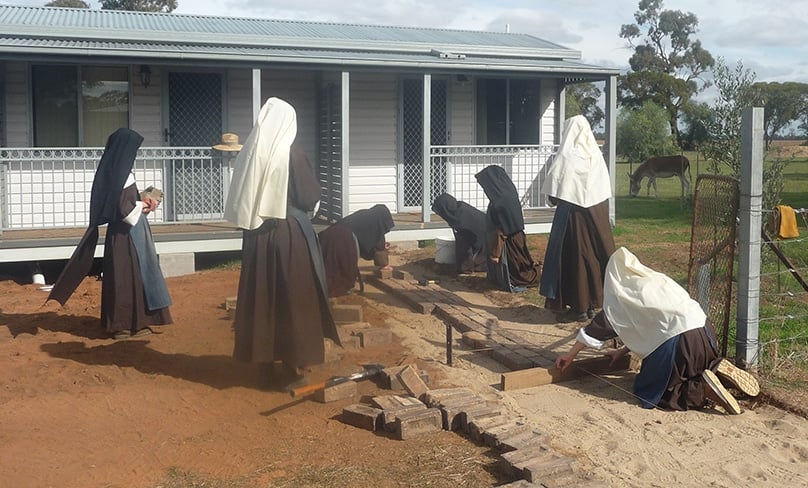
In Mathoura, where the main topics of conversation are weather, wheat and sheep, there’s something growing the locals didn’t expect.
Hidden away from the world on a remote property near the Riverina town of only a thousand people, the Carmel of Jesus, Mary and Joseph want the world to know they are praying for them.
In the four years since four Carmelite Sisters turned a rustic farmhouse into their monastery, not only has the red dust become green grass, but their community has doubled in size to eight and two more women are arriving next month.
They’ve put in two demountable buildings to cater for new vocations while more permanent accommodation is built.
The sisters practice all the traditional aspects of monastic life, including wearing the full habit, fasting, abstinence, enclosure behind walls, austerity, and the personal and communal pursuit of virtue and union with God.
There are no televisions or radios. No mirrors. No shoes. No meat is served. In their place there is prayer and plenty of it.
The little community who call themselves an “oasis in the middle of the wilderness” pray seven hours a day for the outside world from inside the convent’s four walls.
Here, in a rare interview, Mother Mariam Joseph tells The Catholic Weekly how life at the Carmel looks today and its future plans.
CW: This month marks four years at Mathoura, how would you describe life at the monastery today?
Mother Mariam Joseph: Life revolves around daily Holy Mass, constant prayer, striving to live a life hidden with Christ, and honouring the Blessed Virgin Mary.
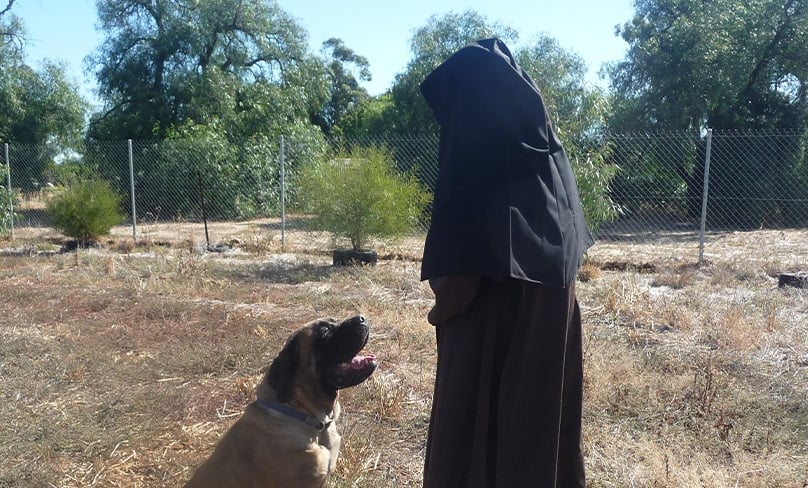
The primary mission of the Carmelite Order is to pray and offer oblation for the church and the world.
Our observance of our Carmelite rule and Constitutions is part of an unbroken tradition stretching back from Mathoura to the USA, Mexico, Spain and to Mount Carmel itself in the Holy Land.
But, of course, the little Mathoura Carmel has grown! More nuns, more supporters, more animals and much more greenery. Our life is very blessed, and the Carmel is like a little oasis in the middle of the wilderness.
CW: There have been challenges establishing a monastery in the outback: flies, drought, heat etc. Are they still a problem?
MMJ. The sisters have adapted to rural life really well. Despite numerous close encounters with snakes and spiders, no one has been bitten. Everyone is used to the flies and the mozzies now.
The hot summers and the cold winters are just a part of daily life. The sisters who grew up in the USA have now grown to love the Australian way of life, in every aspect.
CW: How has life changed from when you first arrived?
MMJ: The changes are primarily in our physical surroundings. The drought ended shortly after we arrived, so the landscape has gradually transformed from red dust to green grass.
We have planted many trees and shrubs, both natives and fruit trees and, of course, rose bushes.
With the increase in sisters we have acquired two demountable buildings to use as temporary housing until our proper monastery home is built.
But our next immediate project is to begin the building of the chapel. Soon we will have 10 nuns living the monastic life at the Mathoura Carmel so a new, bigger chapel space is essential, as our temporary one is much too small for us—particularly as we spend about seven hours each day praying there.
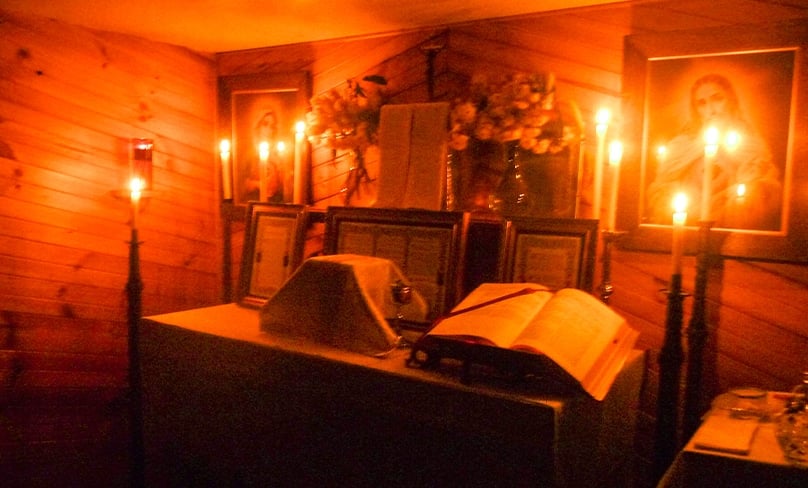
CW: You have welcomed three women since your arrival and two more are coming next month, are you surprised that a life of poverty in remote NSW is proving to be so attractive to young Australian women?
MMJ: It’s not surprising that the cares of the world lead young women to seek that “something else” that monastic life offers. And is it surprising that profound love will inspire women to give up worldly possessions so as to more closely follow Jesus?
If one thinks of religious life as like a marriage, then there are many examples of women who give up plenty so as to enjoy the benefits and blessings of marriage.
It is certainly a great blessing and indicative of the great faith amongst the Catholics of Australia and surrounds.
CW: What is the most common misconception people have about you and your life?
MMJ: If only people knew how much joy and peace we have here in Our Lady’s house, they’d all want to enter and share it!
CW: Will the women spend their entire novitiate at Mathoura, or will they travel to the US?
MMJ: The novices will receive their entire formation at the Mathoura Carmel. This is very important, because forming the family spirit of each Carmel is essential to its growth and then flourishing.
CW: Is there a common thread through their calling?
MMJ: The common thread is a great desire for spiritual treasures, the greatest of which is a loving relationship with Jesus. The uncommon thread is the sisters’ diverse backgrounds.
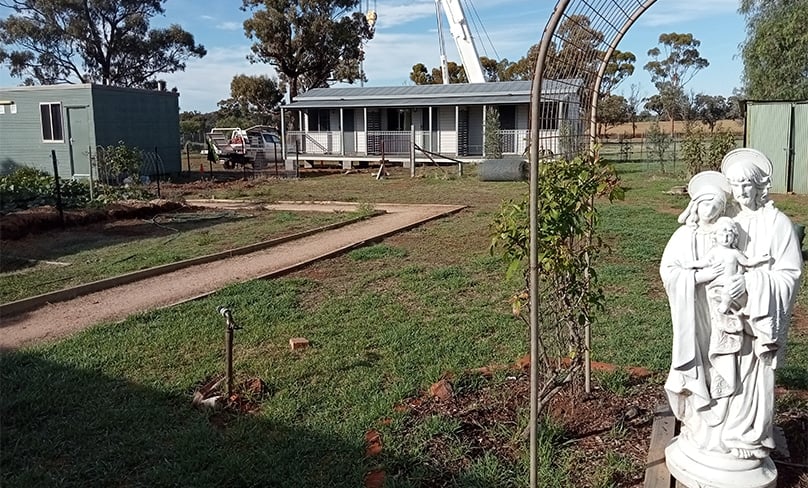
CW: Has the support from the surrounding community continued to grow, and how does that look?
MMJ: Generous people frequently drop off regular donations of cheese, yoghurt, fruit, vegetables, bread and other goodies.
Volunteers turn up regularly to mow the lawns and tend to the gardens outside the monastery enclosure fences. A local farmer kindly ploughs, plants and crops the front paddocks for us.
Whenever there is an emergency—such as a huge snake at the door or possible grassfire evacuation—there are neighbours who will turn up instantly. Our Carmel is so blessed.
CW: Is the support from other religious women around Australia still a great source of inspiration?
MMJ: Yes—there is a wonderful collegiality amongst the various religious houses. We would not still be here without the prayers and love of our dear Carmelite Sisters around Australia, who write to us frequently and are always ready to support us with their experienced advice.
CW: As it’s been months since any substantial rain, would that be one of the most common requests for prayers, or is there something else?
MMJ: Australia is a land of contrasts! Drought when we arrived and so many prayer requests for rain. Then, last year, the terrible floods. So, as you can imagine, our Carmel receives many prayer requests about the weather.
But we mostly get prayer requests for family members who are enduring hardships, both spiritual and physical.
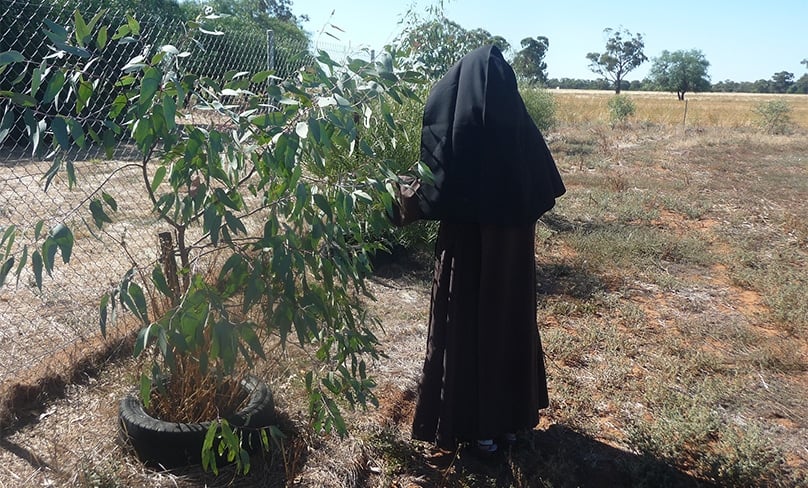
CW: You now have quite a menagerie of animals, can you tell me a little about them?
MMJ: Our alpacas, Esperanza, Silencio, Fintan and Joey, do a lovely job of mowing our paddocks. We shear them (by hand with blade shears!) and use the soft fibre to spin, knit and weave gifts for our benefactors.
The donkeys, Mawsie and Poverello, are in training to pull carts and help with our garden work. In the meantime, their gentle presence keeps our paddocks snake-free.
Poppit, our English mastiff dog, also wards off snakes as she ambles about our home paddock waiting for a pat from the sisters, to whom she is very attached.
Bruno and Nellie, the barn cats, warn off rabbits from the veggie garden and mice from the pantry while soaking up the outback sun.
Darl the chook, the longest-standing member of the barnyard, fearlessly lords it over the rest of the menagerie, claiming first pickings at every food bowl and trough.
CW: As more greenery continues to flourish on the property in very dry conditions, do you see this as a sign of God’s presence flourishing in an increasingly secular society?
MMJ: One can’t help but draw comparisons! Visitors to the Carmel frequently speak as though the physical changes and growth mirror the spiritual growth and peace that the sisters bring to peoples’ lives.
CW: Being enclosed, what would you like Catholics (and non-Catholics) to know about you?
MMJ: That we are praying fervently for you! We accompany you each day from our cloister in your own sufferings.
By means of our life of evangelical poverty, chastity, and obedience, we strive to live in solidarity with the challenges each one of our brothers and sisters faces. Life behind the Carmel walls is one of happiness and love—we feel very privileged to have been given the grace to live this life.
CW: What can Australians do for you?
MMJ: Please pray for the little Carmel of Mathoura! That is the most important thing to do.
Also, join with our latest benefactor who has just committed substantially to the first stage of our permanent monastery.
We are so excited that God has begun to inspire the financial support necessary to raise up an oasis of prayer in our humble location. As more join in this beautiful work, the pace and momentum will increase. Please visit our website to find the donation page: https://carmeljmj.org.au/donate
